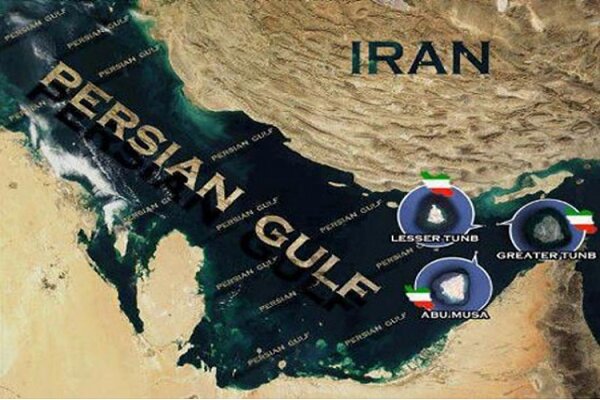Alwaght- The last round of EU-(P) GCC ended last week with a totally anti-Iranian closing statement. The Europeans supported the false claims of the UAE about Iranian trio islands in the Persian Gulf, stirring waves of strong-toned reactions from Iranian officials and people.
In the statement, the European Union, with a noticeable change in tone, used the word "occupation" about Iran's absolute and historical sovereignty over the three islands of Greater Tunb, Smaller Tunb and Abu Musa, showing that descendants of colonial Europe have openly gone on the offensive and are playing their old game of divide and rule.
The fact that the historical documents obviously prove that these islands are Iran's is unquestionable and this sovereignty even dates back to the time before foundation of the UAE and other Persian Gulf Arab monarchies.
For example, in the commemorative atlas of the 50th anniversary of the October Revolution, which was published by the Soviet Union in 1967, the islands of Abu Musa, Greater Tunb and Smaller Tunb are marked in the color of Iran's territory on the map of the Persian Gulf, and under the name of each island, its belonging to Iran is mentioned in parentheses. This is while the foundation of the UAE dates back to December 1971.
In fact, Iran had the sovereignty over these three islands at a time when the Arab sheikhdoms and the United Emirates did not even exist. This document was provided to the UN Security Council by the then government of Iran in 1971.
However, regardless of the historical and irrevocable facts of Iran's sovereignty over the three islands, the EU aims behind this move are completely politically-motivated and driven by the strategic stalemate that this crisis-stricken bloc is dealing with in the current era.
The most important issue and challenge of the EU at the moment is the consequences of the Ukraine war for Brussels, where this war inflicted security, economic, and energy damages on Europe and there are no clear prospects for its settlement in the near future.
With the start of the war in Ukraine as a result of the extensive Western sanctions against Russia, the Russian gas flow to Europe ceased, while a major part of the energy of industries and economic activities and the domestic needs of European countries was supplied by Russia, and measures had not been taken to fill the void. According to the statistics of the International Energy Agency, before the Ukraine war, Russia supplied 30-40 percent of Europe's natural gas, which was about 158 billion cubic meters of gas, and 25 percent of its oil.
Now in the third year of the war in Ukraine, in addition to the pressure of the heavy economic costs of the war on the Western taxpayers, energy is still a challenging issue for many countries of this union at the beginning of the cold season, to an extent that this issue even inflames internal disputes among the member states over pressing ahead with strategy of supporting Ukraine in war.
In the meantime, the oil-rich Persian Gulf states are taking a center stage in the attention of Westerners to fill the energy gap and steer clear of jump in energy prices. Qatar exports liquefied natural gas to some European countries, but according to the signed contracts, it reserves the right to sell the gas to other customers if paid higher.
In mid-March 2022, Germany and Qatar agreed on a long-term energy partnership to significantly increase the share of gas exports from the Persian Gulf to Europe by 2028.
Furthermore, according to Refinitiv Institute, Europeans have replaced Russian oil with Emirati oil.
On the other hand, while European countries have risen towards military and security independence from the US in recent years due to the growing geopolitical-security challenges and the failure of the NATO to address all concerns, they have put on their agenda return to their security and military role in the geostrategically important Persian Gulf region as a world's energy artery, and, indeed, the most important context where the Arab countries can accept the European role is the European divisionism in the form of fueling border, geopolitical, political, and ethno-sectarian disputes.
By founding the criminal Israeli regime in the West Asian region, the Westerners decades ago left a space for their regional interventions for many years and decades, and now they have returned to the same old strategy.
France that is more than any other country seeks military return to the region in 2009 launched a military base with three air, sea, and training sections and in next years expanded its role in the region. In October 2021, Paris said it provided help to Abu Dhabi to strengthen its air defenses and security of its airspace against Yemen's drone and missile attacks. As a result, French military sales to the Arab monarchy grew significantly, including Dassault Rafale fighter jets.
Additionally, the EU is well aware of the Iranian role in mitigation of anti-Russian economic pressures and failure of the sanctions policy targeting Moscow. After launch of Iran's North-South Corridor, Russia's land access to the Persian Gulf and Indian Ocean will be opened. So, EU is seeking to put political pressures on Tehran under the ruse of Iranian military support to Moscow in Ukraine war.
This bloc criticizes Iran's drone and missile programs and describes it a threat to regional security whereas the Islamic Republic is the main weight saving stability in the region and the Persian Gulf through its confrontation of the growing Israeli aggression on Gaza, Lebanon and Syria, and actually it is the European countries that by giving Tel Aviv—which Iran calls the "West's rabid dog"— a leeway for warmongering are seeking escalation to fish in troubled waters.



























